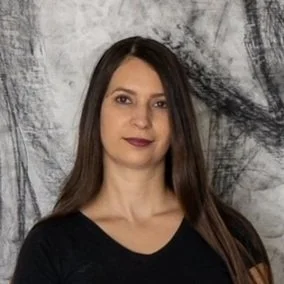Sabra Clay Pot
Charcoal, pastel and polypropylene bulk bag sewn onto canvas,200 cm x 100 cm (79 in x 39 in), 2025
This work was inspired by Tomb’s title, The Broken Vase. As is common with Saleh Mahameed’s practice, she paints over the canvas using charcoal by laying scroll-like canvases on the studio floor while barefoot to create a symbolic language using her hands, fingers and toes.
The sabra—or prickly pear cactus— is a motif that is recurrent in Saleh Mahameed’s practice and serves as a symbol of belonging, of land, culture and identity. The pot at the center of the work is dark and empty, placed upside-down and surrounded by sabra bushes. It may allude to nourishment or to kitchenware— yet it is dysfunctional: empty, inverted, and subsumed by the sabra. Beside it stands a dark sabra bush whose lower part transforms into the artist’s own dark hair— with metamorphosis as a repeating motif in Saleh Mahameed’s work. Other symbols include a sewn bala— or bulk bag— symbolizing the kuffiyeh. She does not handstitch these elements as an act of craft, but as a means of drawing a graphic line in black thread in an act of repeated piercing of the material and to leave marks, mirroring the way her body leaves its traces across the canvas.
Maria Saleh Mahameed lives and works in Ein Mahel. Harking back to her birthplace’s name, Umm Al-Fahm (mother of coal), she incorporates the use of charcoal in her practice as a way of using native materials and honoring the local trade.
Her work is fundamentally rooted in her national and religious identity being raised in a mixed Christian-Ukrainian/Muslim-Palestinian family and her life under occupation. The themes that preoccupy her range from intimate experiences such as pregnancy, childbirth, motherhood, and loss, to her family history and the social, political, and historical elements characteristic within Palestinian society. She holds an M.Ed and B.Ed in Art, both from Oranim College.

